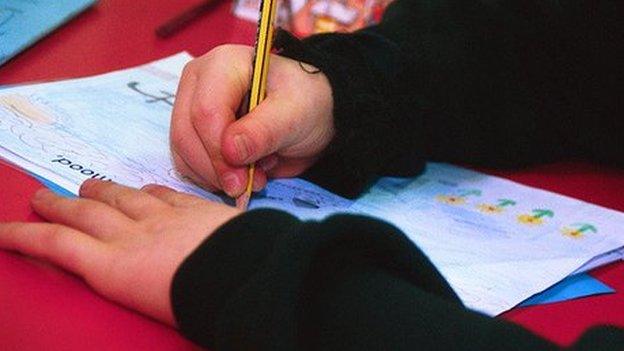Councils unite in bid to tackle Scottish teacher shortages
- Published

Six councils in the north east and north of Scotland have united to tackle teacher shortages in their schools.
The local authorities in Aberdeen, Aberdeenshire, Moray, Highland, Orkney and Shetland are to hold a summit aimed at addressing the issue.
Ministers and officials from the Scottish government and the General Teaching Council for Scotland (GTCS) are among those also involved.
Councils have already tried individual initiatives to ease the problem.
Launching the initiative ahead of the 7 October summit, the councils said the challenge had been recruiting and retaining "sufficient numbers of high-quality teachers to provide the best possible education" for pupils.
Pay weighting
This is in the face of low application numbers for teaching jobs, and rising pupil numbers.
The objective of the new drive is to find a resolution to teacher recruitment and retention on a local and national level.
Consideration will be given to issues such as whether pay weighting should be introduced for those in the north and north east, similar to that given in London, and a national campaign to promote teaching.

Gillian Elliot is teaching in Fochabers after a free accommodation offer
The event has been led by Aberdeen City Council.
Council Leader Jenny Laing said: "Many councils in the north and north east of Scotland are experiencing higher than normal levels of teacher shortages - particularly at senior management levels.
"Whilst not yet at crisis levels it is nevertheless a serious issue that we want to tackle now to protect the interests of pupils.
"We urge the Scottish government to work with us on finding a solution at a national level. This is a case where one-size does not fit all councils."
In 2013, Aberdeenshire Council sent staff to Canada and Ireland to try to recruit new teachers.
Last year, Aberdeen City Council offered to pay the tuition fees of staff who want to become primary school teachers in a bid to tackle the shortage.
And earlier this month, the first teachers took advantage of an offer of free accommodation for six months to teach in Moray.
The council teamed up with a local developer to provide 10 new two-bedroom properties for new recruits.
The local authority said there had been a significant increase in the number of applicants for teaching posts.
'Right skills'
A Scottish government spokesman said: "We are committed to ensuring schools have the right number of teachers with the right skills.
"That is why we acted to safeguard teacher posts for the next year by committing a £51m package of funding for Scotland's local authorities to maintain teacher numbers and pupil-teacher ratios at 2014 levels in 2015-16.
"In each of the last four years the Scottish government has also increased student teacher numbers.
"We welcome the opportunity to engage with local authorities to discuss potential further action to address the issue of teacher recruitment. We look forward to receiving the invitation to the summit and a representative from the Scottish government will attend."
The Educational Institute of Scotland (EIS) welcomed the announcement of the joint summit.
General secretary Larry Flanagan said: "The EIS is willing to engage constructively with councils to explore ways to improve processes for teacher recruitment and retention.
"Attracting teachers to some parts of the country - for example rural or remote areas or areas with a lack of affordable housing - is an ongoing challenge for a number of local authorities.
"While pay and conditions for teachers will continue to be agreed nationally through the Scottish Negotiating Committee for Teachers, it is open to local authorities to explore additional incentives or other means of attracting qualified teachers to come and work in their schools."
And Scottish Parent Teacher Council executive director Eileen Prior said of the news: "Our children deserve no less."

Analysis by Jamie McIvor, BBC Scotland education correspondent
There are a number of possible explanations for the problems in northern Scotland.
For example, the cost of housing in some parts of the north east - an important factor in the overall cost of living - may deter people from moving there if they know their salary would go further in another part of the country.
In rural areas, it can be a challenge to find the right person for any skilled job.
Young people from rural areas who want to become teachers will usually have left home at 18 to study - many may simply not fancy returning to a rural community, at least while they are in their 20s or 30s.
It is important to distinguish between the drop in the overall number of teachers in Scotland in recent years and the all-too-real challenge some councils face filling advertised vacancies.

- Published12 August 2015

- Published3 December 2014

- Published24 July 2013
